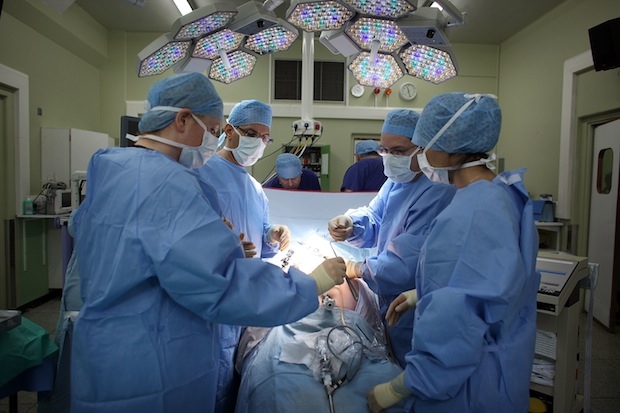I blamed the pheasant casserole, but I did it an injustice. Its only contribution to the drama behind my disappearance in mid-December was a residue of lead shot in the small intestine that briefly confused the radiologist. The real villain revealed by the scan was my appendix, which had taken on the raging, bull-necked, bug-eyed appearance of Ed Balls faced with a set of improving growth figures.
And so it was that I spent a week in the Friarage at Northallerton, a small ‘district general hospital’ that has survived every NHS restructuring to date and is cherished by the citizenry of rural North Yorkshire. For someone who hasn’t been hospitalised since 1957, this was the Full Monty: the ambulance in the night, the agonised wait in A&E, the sudden euphoria of morphine; and when the crisis had passed, the stultifying routine of life on the ward, waiting for the relief of the next visiting hour or doctors’ round or tea trolley or troublesome patient. But at least it gave me time to think — not just about the state of the health service, but about the ailments of the nation in 2014 and beyond.
Of course I shouldn’t leap to generalisations on the basis of a single skirmish with the NHS. But I’ll say this: given limitless demand as longevity rises, inevitable scarcities and bottlenecks of resources, bureaucratic risk-aversion driven by fear of the Daily Mail, and voters’ reluctance to pay more tax for anything, including their own healthcare, it’s a miracle this giant contraption is as robust as it is.
Could it be more efficient? Of course it could, in every corner. It took 60 hours after admission — and a clearly foolish threat to discharge myself — before they finally wheeled me past a scanner appeal poster and fed me into the space-age machine that settled the diagnosis. Staff levels sometimes looked lavish, at other times strained or skeletal. There was no means of knowing who was in charge at any given moment. As for keeping track of the patient, I kept thinking, ‘Why don’t they buy some software from Travelodge or DHL or Ocado, instead of all this scribbled paperwork and duplication?’
But I couldn’t accuse anyone, from consultant surgeon to catering assistant, of not trying their best within an imperfect system, or not caring. I eavesdropped through the curtain on a young nurse — near the end of a 12 hour 40 minute shift, in which the 40-minute lunch break is unpaid — gently comforting a patient whose spirits had crumpled after he woke from a bowel operation to find himself with a temporary stoma bag. It was done with real empathy, and it made me think that the ethos of the NHS is good even if the nuts and bolts are loose.
And in the end, the ‘patient experience’ is far more about ethos than about macro-management structures whose prime objective is cost elimination. What’s needed here is not yet another bout of Whitehall-driven top-down re-engineering, destabilising networks and pitting one entrenched interest group against another — but bottom-up kaizen, the Japanese factory-floor philosophy of continuous improvement.
This is an extract from Martin Vander Weyer’s column in this week’s Spectator. Click here to read the full piece.







Comments